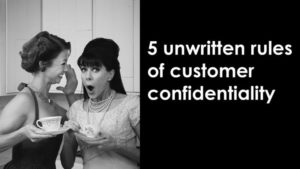Trusted Advisor Customer Service Blog Posts
Written By Jeff Mowatt – (all original content not AI generated)
Written By Jeff Mowatt – (all original content not AI generated)
How Not to End your Emails
 I wish I'd learned this sooner. Eventually I discovered that the more you treat customers like smart adults, the more receptive they'll be to your expertise. Early in my career I used to finish my correspondence with phrases like, "If you have any questions, please don't hesitate to call..." Today, as a customer myself, I still receive emails that end with that phrase. Customers who have questions know they can ask. The offer to accept their questions is not only clichéd - which sounds like we're not really thinking about what we're writing - it's also condescending. Like the customer is too timid or too ignorant to ask questions. As I point out in my Trusted Advisor presentations, every phrase you share either builds or diminishes trust. Next time you write to your customer, you can avoid the unintended insult and invite a response by simply finishing with, "Your thoughts?"
I wish I'd learned this sooner. Eventually I discovered that the more you treat customers like smart adults, the more receptive they'll be to your expertise. Early in my career I used to finish my correspondence with phrases like, "If you have any questions, please don't hesitate to call..." Today, as a customer myself, I still receive emails that end with that phrase. Customers who have questions know they can ask. The offer to accept their questions is not only clichéd - which sounds like we're not really thinking about what we're writing - it's also condescending. Like the customer is too timid or too ignorant to ask questions. As I point out in my Trusted Advisor presentations, every phrase you share either builds or diminishes trust. Next time you write to your customer, you can avoid the unintended insult and invite a response by simply finishing with, "Your thoughts?"
Unpleasant news to give? Try this…
 Part of most people's job involves telling customers and co-workers information they don't really want to absorb. Fortunately, there is a simple technique that I share in this short video that makes bad news more palatable for customers to swallow, and makes your personal brand more appealing. Check it out and feel free to share with your colleagues.
Part of most people's job involves telling customers and co-workers information they don't really want to absorb. Fortunately, there is a simple technique that I share in this short video that makes bad news more palatable for customers to swallow, and makes your personal brand more appealing. Check it out and feel free to share with your colleagues.
Secret Desires of Corporate Clients
2 keys to boosting your business-to-business revenues
by Jeff Mowatt
 Who would you say buys your company’s offerings – corporate buyers, private consumers, or both? People who are buying products and services on behalf of their organizations have different needs than those who are buying for themselves. Losing a single consumer is unfortunate. Losing a large corporate client can create financial fallout. With so much at stake when you are selling ‘business-to-business’ here are a few tips I share in my seminars and speeches on how to gain and keep the loyalty of corporate clients.
Who would you say buys your company’s offerings – corporate buyers, private consumers, or both? People who are buying products and services on behalf of their organizations have different needs than those who are buying for themselves. Losing a single consumer is unfortunate. Losing a large corporate client can create financial fallout. With so much at stake when you are selling ‘business-to-business’ here are a few tips I share in my seminars and speeches on how to gain and keep the loyalty of corporate clients.
Why price isn't paramount
Corporate buyers are not spending their own money; they're spending their company's. So paying a higher price doesn't affect them personally. Corporate buyers are expected to choose the supplier who provides the best overall value. That brings us to two secret desires that your corporate customers won't tell you. Nor will they mention them in tender offerings or in requests for proposal. Knowing them will give you an edge in boosting your B to B revenues.
Desire #1 - Make them Look Smart to their Bosses
It's one thing to claim your products and services provide all kinds of benefits. It's an entirely different magnitude of value when you quantify how much of an impact you are having on that company. So when possible, provide your customer with evidence of the actual cost savings, quality improvements, waste reduction, that your products and services are generating for their business. Your corporate client can then forward those numbers to their bosses and take the credit for the improvements. And for being smart enough to choose you as their supplier. Everyone benefits.
Making your customers look brilliant also means giving them what they need - not necessarily what they ask for. Presumably, you're more attuned to the latest developments in your industry than your customers. Corporate customers typically only have expertise in their outputs - not in the inputs that you supply. So, it's up to you to bring innovations and suggestions on better ways your customers can achieve their goals. Make sure when you present these enhancements, you give them plenty of credit for being open to this innovation. I call this approach the humility advantage. Corporate clients have jobs they're trying to keep, turf they may be defending, and attention they're trying to garner. Why not indirectly help them achieve those goals?
Desire #2 - Make Their Jobs Easier
None of us wants to work harder than we have to. So when your business clients need answers, how accessible are you? Can they easily find answers, check real time inventory, place orders on your website, knowing that you will deliver as promised? If not online, how long does it take your corporate clients to talk to a human when they try to reach you? Our research shows that two of the most powerful words you can use with corporate customers are: hassle-free.
Making your business customers' job easier includes making their jobs more pleasant. In years past, making work more fun meant corporate entertaining... salespeople would wine, dine, and fly business clients to exotic destinations. Some would unfortunately go as far as offering bribes and kickbacks. Today's first world business environment is thankfully, much more transparent and ethical. Plus, corporate customers are so busy with their workload, fighting traffic, and juggling busy personal lives, they aren't particularly interested in socializing with their suppliers after hours. Private meal invitations can also create awkwardness.
With this in mind, one approach that's gaining popularity for entertaining corporate clients is staging special events that include food. Consider bringing a lunch-and-learn to your client or hosting an open house to groups of clients. Include some degree of education relevant to their job such as a speaker who can inform and engage them. Feed them while you teach them and they will come.
One last word on making your corporate clients' jobs more pleasant. In 1854 Henry Thoreau wrote that most people live lives of quiet desperation. To a certain extent I believe that's still true. Your client may be stuck in a dead end job and receive little recognition. So consider the value of offering them a specific compliment. Give a clear example of something they as a person do that makes them a special client. In a job where no one notices, you may be one of the few to make them feel appreciated.
Bottom line - remember that companies don't buy anything. It's people within those companies who make decisions. Make those people looker smarter to their bosses and make their jobs easier. Then notice how your prices suddenly become less relevant.
Let’s Keep this Between Us
5 unwritten rules of customer confidentiality
 Did you ever have a potential customer who should have been excited about doing business with you but seemed reserved? It happened in a weird way for me. The senior managers seated around the boardroom table were excited about their new technology that would disrupt their market and separate them from every competitor. They had brought me in to help craft their sales message and to eventually train their reps on how to introduce it to their customers. Along with their excitement though, I sensed some tension. So as the VP of Marketing introduces me, my first remark to the brass is, “I know this goes without saying. I just want it known for the record that everything we discuss here will be treated by me as confidential.” I immediately noticed this huge look of relief on the face of the CEO. From that point on, things went just fine.
Did you ever have a potential customer who should have been excited about doing business with you but seemed reserved? It happened in a weird way for me. The senior managers seated around the boardroom table were excited about their new technology that would disrupt their market and separate them from every competitor. They had brought me in to help craft their sales message and to eventually train their reps on how to introduce it to their customers. Along with their excitement though, I sensed some tension. So as the VP of Marketing introduces me, my first remark to the brass is, “I know this goes without saying. I just want it known for the record that everything we discuss here will be treated by me as confidential.” I immediately noticed this huge look of relief on the face of the CEO. From that point on, things went just fine.
Customers may not feel comfortable asking you for discretion, but they always appreciate it. Unfortunately, in today’s world of social media oversharing, coffee shops used as offices, and cell phones that record anything anywhere, confidentiality seems to be backsliding into a state of dangerous decline. That’s why you can gain tremendous trust with customers by simply following these 5 unwritten rules of customer confidentiality. Ignore them at your peril.
Rule #1. Know that you are in a position of trust
We’ve all heard of doctor/patient confidentiality and lawyer/client privilege. Doctors and lawyers are sworn to secrecy about their customers’ affairs for good reason. Your customers deserve the same discretion from you. When you talk to others about your customers, assume that the customer is in the room with you, or will read everything you post or write about them. If what you’re sharing isn’t complimentary and publically known, then keep it to yourself.
Rule #2. Remember Starbucks isn't a confession both
I once hired a consultant who was based in another city to do some work on our website. We scheduled a conversation via Zoom about my brand and target market. To my dismay, he logs into the call from a coffee shop. Throughout our conversation, I’m seeing customers come and go in the background. Not only was it distracting, it felt like a violation of my privacy as a client. There are good reasons why lawyers and accountants won’t host you in their office. Instead meetings are held in a private meeting room. One reason is that you shouldn’t see files lying on their desk from other clients who may be under legal investigation, filing for bankruptcy, etc. Another is so your meeting will not be seen or overheard by others. Coffee shops are for casual coffee; not for doing business.
Rule #3. There's a difference between small talk and prying
Ever have this happen to you in a restaurant while you’re paying for the meal? The server is standing by your table waiting for you to input your credit card on the portable device and asks, “So what are your plans for the rest of the day (evening, weekend, whatever)?” Pardon? When did our relationship as patron/ server evolve to the intimacy of me needing to share my weekend plans? The key to making small talk sound natural and appropriate is context and relevance. Unless you’ve been chatting about weekend plans with that person, better to stick to safe topics like the weather as in, “So you’re heading outside... have you heard a forecast?”
Rule #4. Yes, your cell phone conversation is annoying
People who talk at length on cell phones around other people sound like jackasses. Seriously. It reflects a total lack of self awareness and distain for basic civility. It also tells people around them they don’t respect the privacy of the person on the other end of the phone. They’re damaging their own reputation and are too oblivious to realize it. Don’t be one of them. Move to a quiet area and lower your voice.
Rule #5. Strong feelings don't necessitate expressing them
This is perhaps the most important confidentiality lesson at work and in life. We can’t un-say, un-post, or un-tweet our opinions and observations. No doubt you can think of numerous examples at work and in the news where a little discretion and self-restraint would have saved significant fallout. While it’s tempting to be drawn into adding our two cents to a discussion, perhaps the greatest contribution we can make to the relationship is remaining silent. We hope in turn that when we say or do something less than brilliant, others won’t share it with the world. Ironically, kindness and maturity are often best reflected – and trust is sometimes most strongly earned – by simply shutting up.
How to Move Customers Past Price
Do your team members ever give you this excuse when your company loses a customer, “Our competitors are hammering us on price. That’s why we’re losing business.” It’s a convenient excuse that puts the blame on those nasty competitors. But the truth is, most customers don’t buy based on price alone. If that were true we’d all live in the cheapest homes, buy the cheapest vehicles, and every time we went out to eat, we’d always eat fast food. As you know, customers buy based on overall perceived value. The question becomes, what do today’s customer value – to such a degree they will willingly pay a premium? The answers may surprise you.
What customers really want
Having worked with over 400 client organizations and conducted surveys of over 11,000 of their customers, we discovered there are some 35 factors that customers consider (often subconsciously) when they decide to pay a premium. Here are two that I talk about in my training seminars and speeches.
Selection is Over Rated
Today’s customers suffer from decision fatigue. It begins first thing in the morning when they decide what to wear, which lane to drive in, and which of the hundreds of emails or posts on their portable devices are worth their attention. So when it comes to buying something, the last thing customers want is a large selection that makes choosing complicated.
What customers really want in today’s world of too much clutter is what I call A.I.D. - Analysis, Interpretation, and Direction. Customers want you to analyze the various options available for that customer, interpret those options based on the customer’s individual needs, and direct the customer to a maximum of 3 choices. In other words, for complex purchases customers don’t want to work with an order taker. What they value is a trusted advisor.
Don't be better, be different
When it comes to discussing your offerings with potential customers, claiming your product or service is better than the competition, won’t likely motivate them to switch to you. Chances are your established competitors are not selling junk. In customers’ minds, if what they’re currently buying is reasonably good, then it’s not worth the risk and hassle of switching over to you for a slight improvement in quality. Unless you’re offering something that provides a different – as opposed to better - way to achieve an outcome, customers often stick with the devil they know.
That brings us to how you communicate your uniqueness. After listening to the customer’s specific needs, describe to them the conventional solutions to their particular problem. Then explain that given the customer’s unique needs, conventional approaches won’t achieve the desired outcome, and how they may instead create unintended negative consequences. Then reveal how you are bringing a different type of solution; one that addresses their unique needs while avoiding undesirable consequences. Now the customer sees you as significantly different and price becomes less relevant.
Bottom line - Trying to beat your competitors’ prices is rarely a profitable strategy; especially if you’re not a huge organization with massive economies of scale. Instead, remember that what customers really want is greater overall value. Often getting your customers to move beyond price simply means training your team members to change the way they talk with customers. To boost your profits and market share, could it be time for a tune-up of your team’s customer communications skills?
Down-sell to build trust
If you've participated in one of my training sessions, you know I share tips on how to earn trust with customers; even those who are frustrated or are making grudge purchases. When it comes to doing business, trusting someone is way more important that having lots in common or liking someone. One of the most powerful ways of earning trust with new customers is down-selling. That's when customers may be thinking about buying something that goes beyond what they really need. For example, they may be considering ordering a custom product or service that's more expensive, and because it's custom, will delay delivery. You'd suggest an alternative which suits their purposes just fine, is less expensive, and speeds the process considerably. Your organization may make less money in the short term, but you'll build huge trust equity that pays greater dividends long term. The key is everyone in the organization needs to be aligned in doing what's right for the customer.
What are you like on Bad Days?
 Quick - which common words do you use when responding to a request from a customer or coworker? In this short video clip I share a tip on how to convey a positive attitude - even when dealing with customers who are tired, rushed or stressed. Side note: since I posted this tip some years ago, it's received over 50,000 views. Feel free to forward it to anyone who deals with demanding customers.
Quick - which common words do you use when responding to a request from a customer or coworker? In this short video clip I share a tip on how to convey a positive attitude - even when dealing with customers who are tired, rushed or stressed. Side note: since I posted this tip some years ago, it's received over 50,000 views. Feel free to forward it to anyone who deals with demanding customers.
How to earn more do this one thing…
Researchers at the University of Copenhagen studied which personality traits and behaviors lead to people earning the most money over their careers. The results may surprise you. When considering things like being an extrovert, agreeableness, conscientiousness, neuroticism, and openness to experience, the single factor that had the most impact on earnings - conscientiousness. If you've been reading my tips or books or ever attended one of my live presentations you'll know my overriding message is about gaining and keeping trust. Yes, being friendly is fine. But it isn't nearly as important as being reliable. Want to make more money? Don't make excuses. Keep your promises.
Complex leads to Conflicts
 Answer these 3 questions to see how likely your organization is to strengthen customer relationships and prevent conflicts:
Answer these 3 questions to see how likely your organization is to strengthen customer relationships and prevent conflicts:
- Are customers sometimes unclear about the process of doing business with you?
- Are there often extra charges or time requirements that surprise customers?
- Do customers contact you to request information that’s already available online?
If you answered yes to any of these questions, the problem is not likely your customers. The problem is your procedures are more complex than they need to be. The solution is not uploading more documents to hard to find on your web-pages. The real call to action is for you to clarify, and more importantly, simplify. The harder customers have to work to find out what’s really involved in doing business with you, the more distrustful and resentful they will be. Bottom line – a confused customer is a reluctant customer.
Two Questions you Shouldn’t ask Customers or Co-Workers
 This may be surprising, but few people actually want to do business with you. By that I mean people may want the benefits of your products and services. But the actual process of arranging for your services may be more of a have to do than a want to do. That's why it's often a mistake to ask customer or co-workers questions such as, "Would you like me to ...?" or "Do you want me to...?" Frankly, they don't want to go through the decision process at all. Instead, word your questions along the lines of, "Would it make sense for us to..." "Would it be helpful if I...?" "Would it be useful...?" In general, we get better results with questions that focus on resolving the customer's problem, than with questions that encourage them to think about their mood.
This may be surprising, but few people actually want to do business with you. By that I mean people may want the benefits of your products and services. But the actual process of arranging for your services may be more of a have to do than a want to do. That's why it's often a mistake to ask customer or co-workers questions such as, "Would you like me to ...?" or "Do you want me to...?" Frankly, they don't want to go through the decision process at all. Instead, word your questions along the lines of, "Would it make sense for us to..." "Would it be helpful if I...?" "Would it be useful...?" In general, we get better results with questions that focus on resolving the customer's problem, than with questions that encourage them to think about their mood.

